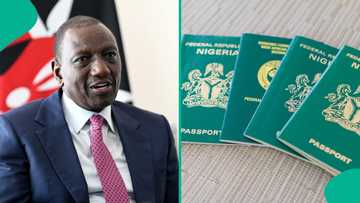Express Entry, Start-Up Visa, Work visa, 10 Other Ways Nigerians Can Migrate to Canada in 2025
- This year, 2025, Canada plans to receive many more immigrants from Nigeria and other countries
- Those looking to migrate can do so legally via express entry and 12 other means
- Truck drivers, nurses and teaching assistants, among others, are needed in the country
A record of 465,000 immigrants are expected to enter Canada in 2023 as part of plans to use immigration to address a rising labour shortfall in the country.
After setting new record in 2021 and 2022, the country intends to surpass previous annual records for permanent residents in each of the following three years.
Legit.ng previously revealed that Canada had established a new immigration path for Nigerian plumbers, carpenters, and welders from other nations. To learn more about the requirements for a Canadian visa for nationals of Nigeria and how to apply, continue reading.

Source: Getty Images
According to immigration.ca, here are 13 legal ways to come to Canada.

Read also
Germany, Italy to give 575,000 work visas, lists available occupations, says Nigerians can apply
Express Entry
Express Entry is has been the predominant method of immigration to Canada. Applications for the three primary government programs—government Skilled Worker, Canadian Experience Class, and Federal Skilled Trades—are managed through the selection system.
There are several new professions that are now eligible for Canada's mass entry immigration stream, from truck drivers to nurses, teaching assistants, and payroll administrators.
According to the most recent Immigration Levels Plan, Canada intends to accept almost 83,000 Federal High Skilled immigrants in 2023, with numbers increasing to 109,000 in 2024 and 114,000 in 2025.
Provincial Nominee Program
Nearly all of Canada's 10 provinces and three territories are able to recommend skilled worker applicants for admission to Canada through this Provincial Nominee Programme which possess the particular talents needed by their respective local economies.
Quebec and the region of Nunavut in Northern Canada are the sole exceptions. Instead, Quebec has the power to create its own standards for deciding who can immigrate for economic reasons.

Read also
Federal service recruitment: 16,000 Nigerians apply as FG advises on what to do during site downtime
Quebec
Canada's province of Quebec and the federal government have a unique immigration agreement. The province has its own guidelines for selecting immigrants who will fit in nicely.
Candidates must first apply to the Government of Quebec for a Quebec Selection Certificate before applying to Immigration, Refugees and Citizenship Canada for permanent residence in order to immigrate as a Quebec-selected skilled worker.
Employment (Work visa)
Foreign nationals who wish to participate in temporary employment in Canada often need a work permit. Two of the main programmes that grant work permits are the Temporary Foreign Worker Programme (TFWP) and the International Mobility Programme (IMP).
The TFWP awards work permits to applicants whose employers receive favourable Labour Market Impact Assessments (LMIA). When an LMIA is approved, it is confirmed that a foreign worker is needed to execute the activity at hand since no Canadian workers are available to do it.
IMP work licences do not require a favourable LMIA. They do request that the business publish an employment offer on their employer portal.
Start-Up Visa
Entrepreneurs have the possibility to move to Canada through the start-up visa programme in order to launch a new business. Immigrant business owners must show that their venture is unique, will generate new jobs for Canadians, and is capable of competing on a global level.
Applicants must own at least 10% of the voting rights linked to all of the company's shares and at least 50% of the voting rights attached to all of the company's shares in order to be eligible for Canada's startup visa.
Candidates must also meet language requirements, receive a letter of recommendation from a recognised organisation, and show they have the financial resources to sustain themselves and any dependents.
Provincial Entrepreneur Programs
Entrepreneurs and businesspeople interested in relocating to one of the provinces that participate in the PNP Business nomination programme may wish to think about making an investment there.
In accordance with PNP programmes, candidates must first ask to be nominated by a province; if nominated, they may then be granted permanent residence.
The applicant must operate a qualifying business in the province in which they want to reside in order to be eligible to use a particular entrepreneur PNP. Typically, a thorough business plan is necessary.
Self-Employed Programs
Candidates for the federal Self-Employed Class should be motivated and capable of starting their own business while also significantly enhancing Canada's cultural, artistic, or athletic life. They should also have appropriate self-employment experience.
Family Class
The Immigration Levels Plan for Canada estimates that wives, partners, and children together make up the majority of the 106,000 members of the Family Class, of which 78,000 are expected to enter the nation by the year 2023.
The Spouse and Common-Law Partner Stream accepts applications from both inside and outside of Canada through the Spouse or Common-Law Partner in Canada Class. Sponsored children are frequently under 22 and not married or involved in a stable relationship.
Parents and Grandparents
In the lottery mechanism used by the Canadian Parents and Grandparents Programme, sponsors sign up for a pool and are then chosen at random to submit an application. Canada anticipates receiving 28,500 new immigrants through the stream in 2023.
Study Permit and Post-Graduation Work Permit
In 2023, 750,000 international students are expected to study in Canada, and the country provides a well-established path for them to get permanent residency. They are the greatest group of transient residents.
Temporary Workers
Numerous routes exist for temporary workers to enter Canada, including the International Mobility Programme (IMP) and the Temporary Foreign Worker Programme, depending on whether they need a Labour Market Impact Assessment (LMIA) or not.
Buy A Business And Move To Canada
Candidates who want to buy a business and immigrate to Canada still have options, such as the Ontario Entrepreneur Success Initiative and the Temporary Foreign Worker Programme.
A recent modification to the TFWP's owner-operator regulations removed the exemption for LMIA advertising obligations. For the proper applicant, the path still remains.
The OINP Entrepreneur Success Initiative is a two-year trial programme with the goal of attracting $20 million in investment and welcome 100 migrants from outside the Toronto area.
Refugee Immigration
To help skilled refugees enter Canada, the federal government recently allocated $6.2 million to a new project called Economic Mobility Pathways.
More than 76,000 newcomers to Canada are permitted under the 2023 Immigration Levels Plan's Refugee Class.
Report Claims 7 Out of 10 Nigerians, Others Denied US Visa for Studies in 2022
Legit.ng earlier reported that according to a survey by the Presidents' Alliance on Higher Education and Immigration, in 2022, the United States declined 71% of visa requests from students from Nigeria and other West African countries.
This comes after the US Embassy in Nigeria announced increasing processing costs for non-immigrant visa (NIV) applications.
The updated fees for different visa categories, according to the embassy's website, will go effective on June 17, 2023.
PAY ATTENTION: Сheck out news that is picked exactly for YOU ➡️ find the “Recommended for you” block on the home page and enjoy!
Source: Legit.ng






